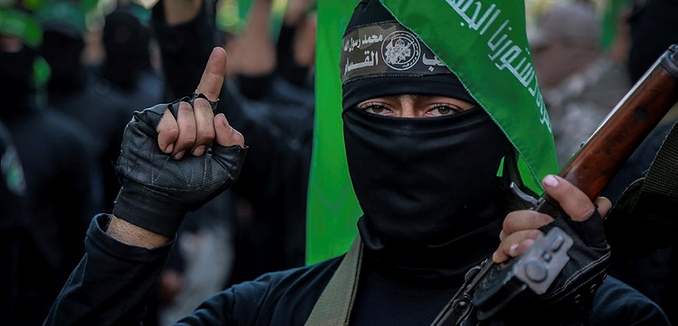Hamas’ execution of its own commander last month suggests a widening schism among leaders of the terrorist group as well as a loss of authority in the Gaza Strip.
Mahmoud Ishtiwi, a senior figure in the Izzedine al-Qassam Brigades who commanded 1,000 men during Hamas’ 2014 war with Israel, was executed on February 7 amid charges of “moral turpitude,” code for homosexuality, The New York Times reported Tuesday. His family had deep ties to Hamas and was considered “royalty” in Gaza for sheltering members of the terrorist group’s leadership, including Mohammed Deif, who was targeted several times by Israel.
Ibrahim al-Madhoun, a writer who is close to Hamas, said the killing highlighted the changes that have occurred in Gaza since Yehya Sinwar became the effective defense minister and representative of the Qassam Brigades in Hamas’ governing structure. “He is harsher than other leaders — he wants his army to be pure,” al-Madhoun explained. “Those who are in the Qassam are the most important people in Gaza. There is a need, they say, to show that these people are not untouchable.”
Ishtiwi’s mother and 11 of his siblings, who have been unusually outspoken in protesting the commander’s killing, talked to the Times about the events surrounding his execution. An unidentified Hamas official confirmed the overall story and some of the details to the Times.
Ishtiwi was initially called in for questioning by Qassam Brigades military intelligence officials in January of last year. After being asked whether he had diverted any money meant for arms purchases for his personal use, he quickly admitted that he did, and this is when his sister says “the telenovela of torture” began.
Ishtiwi’s quick confession led Hamas to believe that he had something to hide. After investigating a number of his troops, officials found a man who claimed to have had sex with Ishtiwi, and concluded that the extra money was used to pay him, possibly for his silence. Hamas was also fearful that if Israeli intelligence officials knew that Ishtiwi was gay, they could have used the information to compel him to give them information about the terror group.
Rumors that Ishtiwi was responsible for giving Israel information on the whereabouts of Deif, who was injured in an Israeli airstrike during the 2104 war, were later circulated, though no proof was presented.
When one of Ishtiwi’s sisters asked him during a February jail visit if the charges were true, he said yes. She then asked a guard if they had tortured her brother in any way. “He confessed without us giving him even a slap,” the guard responded. The sister claimed that Ishtiwi then raised his hand to show the word “zulum,” which means wronged, written three times on his palm.
Ishtiwi told his brother Hassam two weeks later that he had been tortured since his fourth day in custody. When his two wives visited him in jail a month and a half later, he gave them a note that read, “They nearly killed me. I confessed to things I have never done in my life.”
Ishtiwi’s relatives said that he continued to profess his innocence to them. They also described the torture he was subjected to, including beatings, being suspended from the ceiling for hours at a time, and having loud music blasted into his cell to keep him from sleeping.
A sister said that he showed her that he scratched “zulum” into his leg using a nail, as a message if he were ever killed. Ishtiwi also wrote a two page letter professing his innocence and describing the abuse he was subjected to. According to family members who saw the letter, he outlined mistakes made by other commanders that led to the deaths of men under their command. According to Ishtiwi, it was those commanders who orchestrated his arrest.
Two of his sisters brought the letter to Hamas leader Ismail Haniyeh in June of last year. While he denied their request to allow their brother a lawyer or a visit from the Red Cross, he didn’t rule out the possibility of an internal review of Ishtiwi’s case.
“We are children of this movement,” one of the sisters posted to her Facebook page after the meeting. “We thought that we would resolve the matter between us.” However, she wrote, “The trust was broken.”
While Ishtiwi’s execution sealed his family’s loss of faith in Hamas, it also reflects a broader division within the terror group, according to an analysis written for Newsweek last week by Jonathan Schanzer, vice president of research at the Foundation for Defense of Democracies.
The al-Qassam Brigades, the so-called “armed wing” of the Palestinian militant group Hamas, is reeling from the recent execution of former official Mahmoud Ishtiwi at the hands of his fellow fighters. Several members of the Hamas fighting force resigned in protest, arguing that Ishtiwi was killed because of internal arguments within Hamas rather than immoral behavior, as was first reported. The schism has produced a new breakaway faction—the Free Qassam Members (al-Qassamiyoun al-Ahrar) which is openly speaking out against the al-Qassam Brigades leadership and calling for an investigation.
More generally, Schanzer observed, Hamas is suffering from a lack of direction.
Thus, while its founding charter has not changed, Hamas appears to be lacking direction. Its military wing and a gaggle of political leaders in exile are locked in a competition. Add to that the public frustration with the Gaza-based government leadership, and it’s hard to pinpoint which faction or which leader is actually steering the organization.
Schanzer warned that while these divisions mean that Hamas is weakened, that weakness also poses risks to Israel.
But a fractured terrorist organization can also be more unpredictable. Hamas lacks command and control. A single faction could launch a war that the rest of the organization does not want—and one that Israel or Western intelligence might be less likely to predict.
[Photo: Emad Nassar / FLASH90 ]




